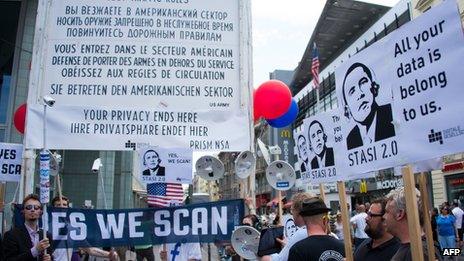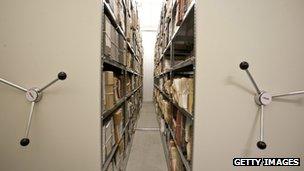EU anger at US spy scandal softened by trade talks
- Published
- comments

How angry are the Europeans over reports of American spying in Europe? They are outraged but they are not so angry as to risk their economic interests.
On the surface Europe's leaders are deeply insulted. The president of the European Parliament, Martin Schulz, says the revelations showed "the United States of America treats its closest partners, including Germany for example, but also the European Union as a whole like hostile powers". Many MEPs share that view.
In Germany, Angela Merkel's spokesman said curtly: "We are not in the Cold War anymore."
The Germans are particularly sensitive to the idea of a big brother state. Many lived in the former East Germany under the all-seeing surveillance of the Stasi with their legions of informers, their listening devices and their prisons with rows of interrogation rooms. The Germans are acutely sensitive to their private communications being intercepted.
The Germans are also struggling to understand why their country appeared to be the biggest target for the National Security Agency (NSA) in Europe. They cannot comprehend why the NSA would save each month data from half a billion calls, emails and text messages as the reports suggest.
Clarifications sought
In Brussels, they are offended at the alleged bugging of EU embassies and they are baffled as to why the intelligence agency of a friendly power would want to listen in to communications from the Justus Lipsius building where EU summits are held.
Some EU officials have gone as far as to suggest the forthcoming trade talks with the United States should be suspended until Washington accounts for its activities.
The European Justice Commissioner Viviane Reding said that "if there is any doubt that our partners are bugging the offices of European negotiators, then the future trade talks could be in difficulty".
France's President Francois Hollande has taken a similar line: "We cannot have any negotiations or deals in any domain unless we get these guarantees (from the United States) over what is happening in France and that goes for the EU as well."
The French president called for Europe to co-ordinate its position and the explanations it would be demanding from Washington.

Many Germans are acutely protective of their privacy after decades of Stasi surveillance
There has been a more nuanced response from the European Commission and other senior EU officials.
President Manuel Barroso said that if these reports "are proven true, this would be very disturbing and raise serious and very important concerns". He and others are seeking clarification.
What they are not doing is threatening to break off the trade talks. The prize is too important.
Privately officials say it is inconceivable that the US-EU trade talks, due to begin on 8 July, will be derailed. If successful, they will deliver the biggest trade deal in history.
Just for the UK it could mean a 11.7b euros (£10bn) boost in trade. In the EU, fearful of years of stagnation ahead, the trade deal with the US is seen as one of the big potential growth boosters.
These revelations won't win the Americans any friends in Europe but then there is realpolitik; growth and jobs.
Data under scrutiny
Now the instinct of some is to drag the US secretary of state before the European Parliament and to demand some answers. It won't happen like that.
President Barack Obama has promised an explanation but the detail is unlikely to be delivered in public but through diplomatic and intelligence channels to various European governments.
From President Obama's public statements, it is already clear what the Americans will argue. Firstly, that gathering intelligence is the way the world works.
Every intelligence service in Europe, he said, does its best to understand the world better, and that goes beyond what they read in newspapers.
Mr Obama went on to say that "in European capitals there are people who are interested, if not what I had for breakfast, at least what my talking points might be, should I end up meeting with their leaders".
The difficulty for Washington will be to explain the scale of data collection and its purpose.
It is one thing to target potential terrorists or people traffickers or traders in nuclear materials but quite another to target the EU embassy in Washington. The Europeans will want to know what happens to this material, how is it supervised and where is the democratic accountability.
The report in Der Spiegel, external carried a revealing quote from Jeremy Bash, a former chief of staff to the ex-head of the CIA, Leon Panetta. Mr Bash said that "if you're looking for a needle in the haystack, you need a haystack".
America, because it has the means, is vacuuming up as much of the haystack it can, harvesting huge quantities of data and then looking for the connections, the numbers, the links which might be significant to any investigation.
'Friendly' spying
American officials point out that the French intelligence service is far from idle.
Friendly nations do spy on each other. The Israelis recruited Jonathan Pollard, a US government analyst, to gain access to military intelligence in the States.
The Americans will also say there is increasing concern over the attempted theft of commercial secrets, with China their prime suspect. Germany is one of China's largest trading partners and the Americans want to know what the Chinese and other nations are interested in. It is one reason why Germany gets more attention than elsewhere in Europe. But that is unlikely to convince too many Germans.
At the very least, Europe's leaders will want to be able to tell their voters the scale of American intelligence gathering in Europe and how it is used.
That won't be easy but, for the moment, it seems unlikely to cause a serious rupture in transatlantic relations.
Some in Europe were suggesting that Edward Snowden should be offered asylum as a riposte to Washington. The reality, however, is that officials in Germany, Norway, Austria, Poland, Finland and Switzerland have all insisted that Snowden can only make his asylum request when he is on their soil - which rules out him getting refuge there.
One postscript to all this: It is yet another example of how governments and institutions are being challenged by activists, leakers, hackers and whistleblowers. They are having a significant impact on politics.
In the UK, it is groups like UK Uncut and the tax justice network that have focused attention on the tax arrangements of major international companies. It is whistleblowers that have revealed some of the hidden secrets of intelligence gathering. It is activists who have leaked the accounts from some of the tax havens which have led to moves to curtail the offshore world.
This is the era of the anti-establishment activist and that contains warnings for international institutions like the EU and European governments if they fail to deliver jobs and growth.